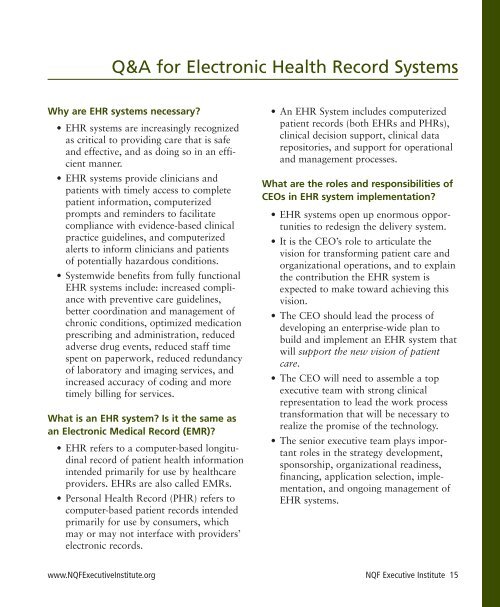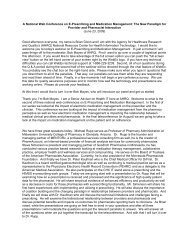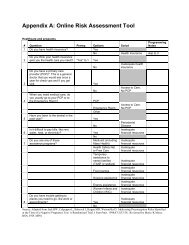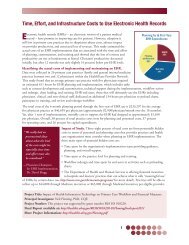CEO Survival Guide - AHRQ National Resource Center; Health ...
CEO Survival Guide - AHRQ National Resource Center; Health ...
CEO Survival Guide - AHRQ National Resource Center; Health ...
Create successful ePaper yourself
Turn your PDF publications into a flip-book with our unique Google optimized e-Paper software.
Q&A for Electronic <strong>Health</strong> Record SystemsWhy are EHR systems necessary?• EHR systems are increasingly recognizedas critical to providing care that is safeand effective, and as doing so in an efficientmanner.• EHR systems provide clinicians andpatients with timely access to completepatient information, computerizedprompts and reminders to facilitatecompliance with evidence-based clinicalpractice guidelines, and computerizedalerts to inform clinicians and patientsof potentially hazardous conditions.• Systemwide benefits from fully functionalEHR systems include: increased compliancewith preventive care guidelines,better coordination and management ofchronic conditions, optimized medicationprescribing and administration, reducedadverse drug events, reduced staff timespent on paperwork, reduced redundancyof laboratory and imaging services, andincreased accuracy of coding and moretimely billing for services.What is an EHR system? Is it the same asan Electronic Medical Record (EMR)?• EHR refers to a computer-based longitudinalrecord of patient health informationintended primarily for use by healthcareproviders. EHRs are also called EMRs.• Personal <strong>Health</strong> Record (PHR) refers tocomputer-based patient records intendedprimarily for use by consumers, whichmay or may not interface with providers’electronic records.• An EHR System includes computerizedpatient records (both EHRs and PHRs),clinical decision support, clinical datarepositories, and support for operationaland management processes.What are the roles and responsibilities of<strong>CEO</strong>s in EHR system implementation?• EHR systems open up enormous opportunitiesto redesign the delivery system.• It is the <strong>CEO</strong>’s role to articulate thevision for transforming patient care andorganizational operations, and to explainthe contribution the EHR system isexpected to make toward achieving thisvision.• The <strong>CEO</strong> should lead the process ofdeveloping an enterprise-wide plan tobuild and implement an EHR system thatwill support the new vision of patientcare.• The <strong>CEO</strong> will need to assemble a topexecutive team with strong clinicalrepresentation to lead the work processtransformation that will be necessary torealize the promise of the technology.• The senior executive team plays importantroles in the strategy development,sponsorship, organizational readiness,financing, application selection, implementation,and ongoing management ofEHR systems.www.NQFExecutiveInstitute.org NQF Executive Institute 15
















